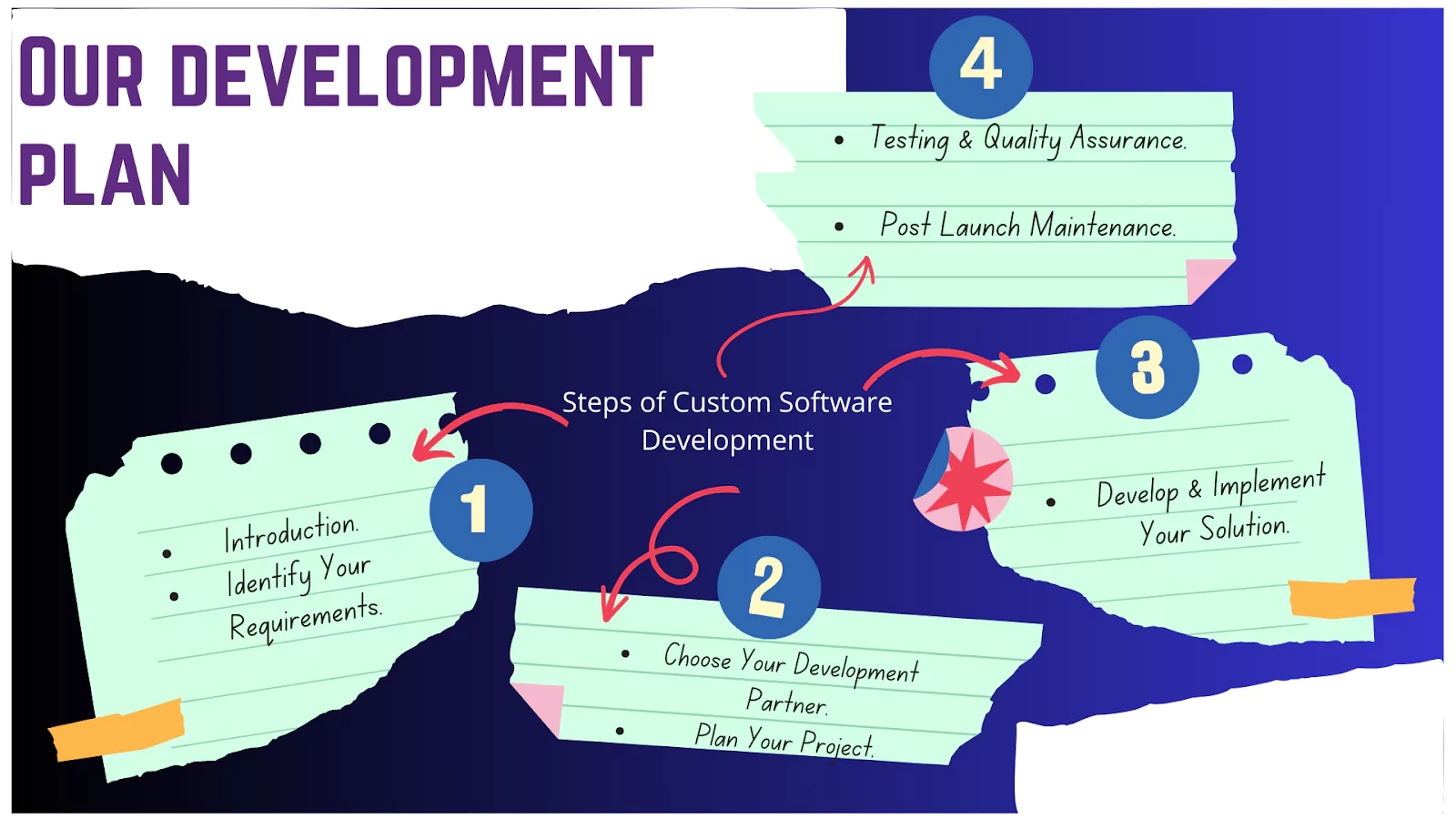In today’s fast-paced digital landscape, small businesses face a constant challenge: how to compete with industry giants who have seemingly endless resources at their disposal. The answer lies in custom software development. By investing in software tailored to their specific needs, small businesses can level the playing field and achieve remarkable results.
But what exactly is custom software development, and how can it benefit your small business? Let’s dive into the world of bespoke software and explore its potential to transform your operations, enhance your customer experience, and ultimately, empower your business to thrive.
The Power of Custom Software Development
To illustrate the transformative power of custom software development, let’s delve into some real-life examples of how innovative IT solutions have transformed work environments and personal spaces:
1. Streamlining Operations for a Local Bakery:
A small bakery in a bustling city faced challenges in managing its inventory, orders, and customer interactions. Through custom software development, they implemented a comprehensive solution that integrated their point-of-sale system with their inventory management and online ordering platform. This resulted in a streamlined workflow, reduced errors, and improved customer satisfaction.
2. Empowering Remote Work for a Design Agency:
A design agency with a distributed team of employees needed a secure and efficient way to collaborate on projects. Custom software development provided them with a cloud-based platform that facilitated seamless communication, file sharing, and project management, enabling them to work effectively regardless of their location.
3. Enhancing Personal Fitness with a Mobile App:
A personal trainer recognized the need for a customised fitness app that could cater to the individual needs of his clients. Custom software development allowed him to create an app that provided personalised workout plans, tracked progress, and offered real-time feedback, empowering his clients to achieve their fitness goals more effectively.
4. Revolutionising Education with Interactive Learning Tools:
An educational institution sought to enhance student engagement and improve learning outcomes. Custom software development led to the creation of interactive learning tools that gamified the learning process, making it more enjoyable and effective for students of all ages.
These examples showcase how custom software development can be applied across various industries and sectors, addressing specific challenges and unlocking new opportunities for growth and success.

Challenges of Custom Software Development
While the benefits of custom software are undeniable, it’s important to acknowledge the challenges involved. The process requires careful planning, collaboration, and a clear understanding of your business needs. Here are some key challenges to consider:
- Defining your needs: Clearly outlining your business goals and desired functionalities is crucial for guiding the development process.
- Finding the right development partner: Choosing a skilled and experienced software development firm with a proven track record is essential.
- Managing costs: Custom software development can be an investment, so it’s important to set realistic expectations and manage your budget effectively.
- Testing and implementation: Thorough testing and a smooth implementation process are critical to ensuring the success of your software.
The Biggest Advantage of Custom Software
Despite the challenges, the biggest advantage of custom software is its ability to uniquely address your specific business needs. Unlike off-the-shelf software that offers generic solutions, custom software is designed to fit your workflows, data structure, and unique requirements like a glove. This translates to increased efficiency, improved data security, and a more personalised experience for your customers.
Empowering Small Businesses in the Digital Age
In today’s competitive landscape, custom software development is no longer a luxury; it’s a necessity for small businesses looking to thrive. By investing in bespoke software solutions, you can:
- Automate manual tasks: Free up your team to focus on strategic initiatives by automating repetitive tasks.
- Improve data accuracy and security: Gain complete control over your data and ensure its security with custom-built software.
- Enhance customer experience: Offer personalised experiences and cater to your customer’s specific needs.
- Gain a competitive edge: Stand out from the crowd and differentiate your business with unique software solutions.
- Scale your business: Build a solid foundation for growth with software that adapts and evolves with your needs.
Conclusion: Your Path to Success
Custom software development is a powerful tool that can empower your small business to compete effectively, achieve operational excellence, and ultimately, achieve your entrepreneurial dreams. By embracing this technology and partnering with the right software development firm, you can unlock your business’s full potential and pave the way for a successful future.
Ready to explore the world of custom software development? Contact ThinkScoop Inc. today. Our team of experienced developers is passionate about helping small businesses like yours achieve their goals through innovative software solutions.
Remember, your success is our success. Let’s work together to build a brighter future for your business.
FAQ
Q 1: What is Custom Software Development?
Custom software development involves creating unique programs or applications tailored to meet the specific needs and requirements of a business. Unlike off-the-shelf software, which offers generic solutions, custom software is designed from scratch or modified extensively to fit a particular business model, workflows, and goals.
Q 2 : How Much Does it Cost to Develop Custom Software?
One of the most common questions businesses have is about the cost of custom software development. The truth is, there’s no one-size-fits-all answer. The cost can vary widely based on factors like complexity, features, development time, and the expertise of the development team. However, the investment in custom software pays off in the long run by providing unique functionalities that boost productivity and efficiency.
Q 3: How Do I Create My Own Software Program?
Creating your own software program may seem daunting, but with the right approach, it’s achievable. Here are some steps to guide you through the process:
Define Your Objectives: Clearly outline what you want the software to achieve. Identify pain points and areas for improvement in your current workflows.
Research and Plan: Conduct market research to understand existing solutions and gather ideas. Create a detailed project plan with milestones and timelines.
Choose the Right Development Partner: Partner with an experienced IT consultancy firm like ThinkScoop Inc. Discuss your requirements, budget, and expectations upfront.
Development and Testing: The development team will create the software based on your specifications. Testing is crucial to identify and fix any bugs or issues.
Deployment and Maintenance: Once the software is ready, deploy it in your business environment. Regular maintenance and updates ensure optimal performance over time.
Q 4: What is Custom Business Software?
Custom business software refers to applications or systems designed specifically for a company’s unique needs. It can include inventory management systems, CRM software, project management tools, and more. The key advantage of custom business software is its ability to adapt and evolve with the business, providing a competitive edge.
Q 5: What Are Some Examples of Customised Software?
Customised software comes in various forms, tailored to specific industries and functions. Here are some examples across different sectors:
- Healthcare: Electronic Medical Records (EMR) systems customised for clinics or hospitals to manage patient data securely and efficiently.
- Education: Learning Management Systems (LMS) designed for schools or training centres to deliver online courses, track progress, and manage student information.
- Manufacturing: Inventory management software customised to track raw materials, production processes, and product shipments in manufacturing facilities.
- Finance: Accounting software tailored for small businesses to manage expenses, invoicing, payroll, and financial reporting.
Let’s dive into some examples related to small business software solutions:
Avanquest Smart Business Pack
Small Business Accounting Software
EZ Small Business Software 3300
MyBusinessCatalog Platinum Small businesslicense
Adobe InDesign CC for teams – Subscription New – 1 user
Small Business Complete, Traditional Disc 8054206
Individual Software Platinum Small Business Solution for Up to 100 Employees Electronic Software
Streamline Business Finances with Custom Computer Invoices Software Manager | Billing & Payment Tracking




